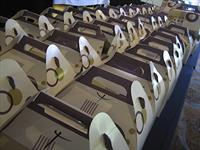How do you get the highest ROI on membership dollars for joining MPI? Get Involved!
Get Involved
I Put Out Many Fires, But I’m Not a Firefighter: All the Food is Gone
As event professionals, the vast majority of our job is spent planning, preparing and anticipating. Only a very small portion of the job involves the actual execution of the event on site.
In my case, I plan one medical conference a year. I spend 361 days planning it and only 4 days executing it on site. Faced with this prospect, and because of the type of people we generally are (type A’s), we have not given ourselves the permission to fail. There are going to be disasters on site or, at the very least, hiccups during our events. What separates the great event professionals from the good event professionals is how we handle these situations on site, both logistically and emotionally.
 The ‘fire’ I had to fight happened in 2014. I was working with another medical association at the time, helping to plan the largest medical education conference in Canada (which attracted 3,000 delegates). It was the last day of the conference and we could see the finish line in the distance. We could feel our free evenings and weekends again and taste the sweet champagne that awaited us in the show office. Our conference always ended with a closing keynote at lunch. To save costs and facilitate an easy departure home for our delegates, we always serve a grab and go boxed lunch following the plenary. Once the keynote speaker had taken the stage and the presentation was running smoothly, the conference team left the plenary room to split up to perform various other tasks; meeting room checks, exhibitor tear down etc.
The ‘fire’ I had to fight happened in 2014. I was working with another medical association at the time, helping to plan the largest medical education conference in Canada (which attracted 3,000 delegates). It was the last day of the conference and we could see the finish line in the distance. We could feel our free evenings and weekends again and taste the sweet champagne that awaited us in the show office. Our conference always ended with a closing keynote at lunch. To save costs and facilitate an easy departure home for our delegates, we always serve a grab and go boxed lunch following the plenary. Once the keynote speaker had taken the stage and the presentation was running smoothly, the conference team left the plenary room to split up to perform various other tasks; meeting room checks, exhibitor tear down etc.
The venue staff brought out lunch for 900+ people on rolling tables, to be available for when the plenary finished at 12 p.m. At 11:50 a.m., we received a call from the volunteer in the area that all the food was gone! We immediately ran to the lunch area. Although we believed the volunteer, seeing it somehow made it more real and helped us digest the severity of the situation; we had 10 minutes to make food for 900 people!
We spoke with venue staff and asked them what food they had in the back. Given that it was the last day of our conference and without another large event immediately following ours, they had no substantial meals to offer us. However, they did have non-perishable food available. We filled the tables with any remaining sandwiches, bags of chips and popcorn, granola and energy bars, dried fruits and nuts, and juice bottles. At 12 p.m., over 900 delegates poured out of the plenary room and headed towards us to grab their food and head home.
The venue kept the snack food replenished while the conference staff remained in the area to apologize and handle delegate questions. When something is not going according to plan at your event, it is your responsibility to be available to answer questions and receive feedback from your guests. We have to take ownership for mistakes. Simply being available shows your guests that you are aware of the situation, are sensitive to their pain and are working quickly on finding a solution to their issue.
With the situation resolved, we then investigated how it happened to minimize risk for the future. It is standard practice for venues to bring food out early. However, in this case, the food was placed uncovered, in a high traffic area frequented by conference delegates, hotel guests and the public. The food should have been covered with fabric and made available only minutes before 12 p.m.
Secondly, an oversight on our part was not providing clear instructions to the volunteer in the area regarding who was entitled to this food and how much each delegate could take. Although non-conference delegates were helping themselves, even conference delegates who came out of the plenary early before we had arrived, were taking 2-3 boxed lunches each. Spouses and children of delegates in the plenary were filling their backpacks up with as much food as they could carry!
For all subsequent conferences, we provided volunteers with training sessions before the conference, which included details about their specific roles (and not just for the conference as a whole). This allowed our volunteers to be informed and feel empowered to step in if something didn’t look right.
A few years ago, I was discussing with a colleague why being an Event Professional is always rated as one of the most stressful jobs in the world. He said “because when we fail, we fail on a public stage.” Failure in any form is difficult to handle. It is even more difficult to handle when hundreds or thousands of people are watching you fail. However, it is our job to remain calm, think on our feet, come up with a plan, and provide clear instructions to remedy the situation. We also need to be able to diagnose how and why the situation happened in the first place. When communicating with key stakeholders, you will gain more respect by admitting mistakes, demonstrating the lessons learned and communicating the steps you have put in place to ensure the situation doesn’t happen again. Remember, it is not a complete failure if you learned something from the experience.
Want to contribute to this blog series? Have a great event story you learned from? Please connect with aleen.kilislian@georgebrown.ca and stay tuned to hear more “I Put Out Many Fires…” stories!
About the Author:

Karen Norris, CMP
Karen is a passionate event professional dedicated to highlighting the importance of the meetings & events industry. She currently plans the largest surgical meeting in Canada for the Canadian Association of General Surgeons. You can follow her on Twitter or connect with her on LinkedIn.

Leave a commentOrder by
Newest on top Oldest on top